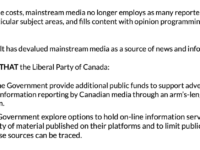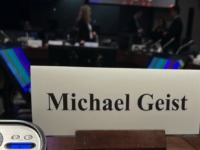Bill C-18, the Online News Act, has now shifted to the Senate, where the Transportation and Communications committee, is reviewing a bill that has led Meta to say it plans to block news sharing in Canada altogether in the bill passes in its current form. I appeared before the committee earlier this month with discussion that focused on a wide range of issues, including the risks of mandating payments for links, the non-compliance with international copyright obligations, why the CBC should not be included in the payment for links system, and how a fund would be a better approach. This week’s Lawbytes podcast goes inside the committee room for my opening statement and exchanges with half a dozen Senators.
Post Tagged with: "c-18"
This Must Stop: Government and Liberal Party Go All-In On Speech Regulation With Political Truth Oversight Bodies, Mandated Press Source Tracing, and Disclosure of Critics’ Communications
Earlier today, the Liberal party convention approved (subject to a final vote) two stunning policy resolutions with enormous implications for freedom of expression. First, as discussed yesterday, it approved a resolution that seeks to “hold on-line information services accountable for the veracity of material published on their platforms and to limit publication only to material whose sources can be traced.” If enacted, the policy would undermine freedom of the press and could even spark widespread censorship on Internet platforms. In addition, it passed a resolution to develop “truth in political advertising” legislation to be administered by an oversight body. There are legitimate concerns about the “truthiness” of all political parties communications, but political truth oversight bodies carries great risk and is unlikely to foster enhanced public trust.
Liberal Party Policy Proposal Would Limit Online Publication to Material “Whose Sources Can Be Traced”
The Liberal Party policy convention is underway in Ottawa with delegates preparing to debate a series of policy proposals that could ultimately make their way into their national election platforms. Party members voted on the top 20 proposals for discussion and included one involving the media and online information that seems obviously unconstitutional and a direct threat to a freedom of the press. The proposal, purportedly aimed at addressing misinformation, calls for more government funding for the media and that the government explore options to “hold on-line information services accountable for the veracity of material published on their platforms and to limit publication only to material whose sources can be traced.”
Fixing Bill C-18: My Appearance Before the Senate Standing Committee on Transportation and Communication
I was pleased to appear yesterday before the Senate Standing Committee on Transportation and Communication on Bill C-18. The discussion focused on a wide range of issues, including the risks of mandating payments for links, the non-compliance with international copyright obligations, why the CBC should not be included in the payment for links system, and how a fund would be a better approach. My opening statement, which tried to identify some fixes to the bill, is posted below as text and as a Youtube video.











